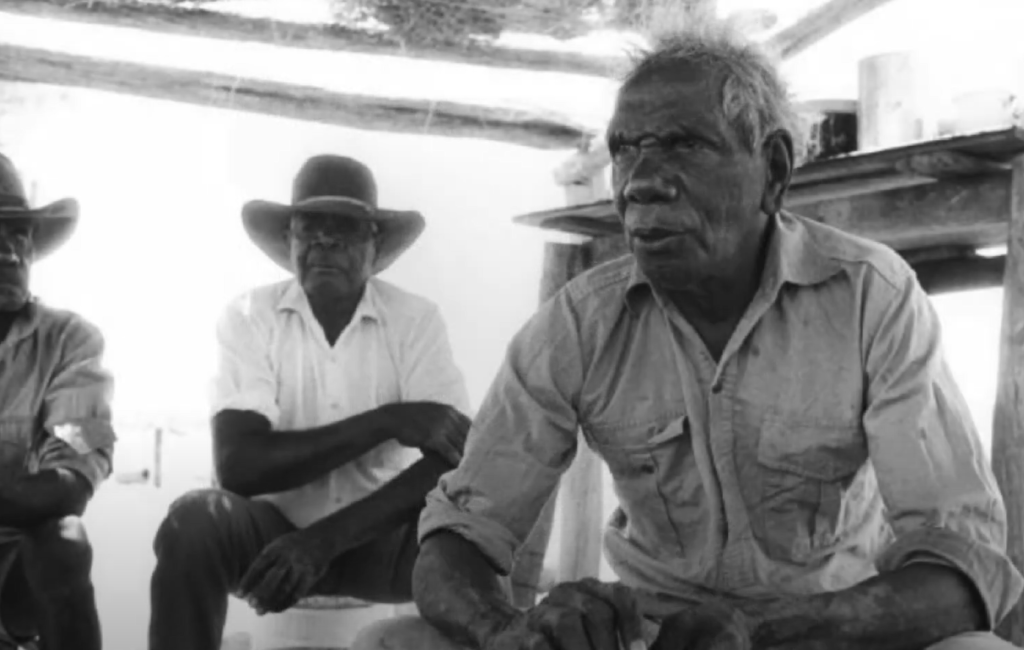Watch Video
Read Article
WARNING: Aboriginal and Torres Strait Islander readers are warned that the following post may contain images of deceased persons.
We remember the Gurindji Strike, also known as the Wave Hill walk-off, which began on the 23rd of August 1966.
The strike began when 200 Gurindji stockmen, domestic workers, and their families, walked off the Wave Hill pastoral station, owned by the British company Vestey Group.

It was a pivotal protest by Aboriginal workers against racism – and for Award wages, for Land Rights and for self-determination.
Vestey’s racist treatment of the Gurindji workers it employed was emblematic of racism in broader Australian society.

Aboriginal workers at the station received one-third of the wages of non-Indigenous workers.
The Gurindji were treated with contempt by supervisors and were forced to endure unliveable accommodation.
On the 23rd of August 1966 Vincent Lingiari, led the walk-off.

This action was supported by other prominent Indigenous activists such as Dexter Daniels, the Indigenous organiser for the North Australian Workers Union.
Mr Daniels had been involved in other actions by Indigenous workers for award rates. When the leadership of the North Australian Workers Union refused to back the expansion of these strikes, Mr Daniels took leave from his post with the union, and continued his activism.

In March 1966, the Arbitration Commission had conceded the demand for equal pay, but greatly insulted Indigenous workers by insisting they wait until 1968 before their pay was equalised.
At Wave Hill, Lingiari requested that Indigenous workers on the station receive equal pay immediately.
When he was refused, the walk off began.

The Gurindji strike was for equal pay, but it was also for respect and recognition.
Respect for their dignity as human beings, and recognition of their status as the traditional owners of the land.
The strikers set up a settlement at the nearby Wattie Creek and called for the return of their land.
They used their connections with the trade union movement to build support.
The trade unionist Brian Manning, of the Waterside Workers Federation, volunteered on 15 occasions to drive supplies the 750 kilometres from Darwin to Wattie Creek.

Mr Daniels and fellow-activist Lupna Giari conducted a speaking tour sponsored by the Building Workers Industrial Union and Actors Equity, addressing sixty meetings in just over a month in which they explained their cause.

Lingiari addressed the Waterside Workers Federation to ask for their support.
The Australasian Meat Industry Employees Union placed a ban on any products being produced by replacement labour at Wave Hill.

Other unions held mass meetings, raised collections to support the strikers, and pressured politicians to act.
In August of 1975, Labor Prime Minister Gough Whitlam symbolically poured earth from the Gurindji land into the hands of Vincent Lingiari, and presented a leasehold over part of their land.
The strike was one of extraordinary courage and determination by the Gurindji, and is widely acknowledged as a defining moment in the struggle for Land Rights in Australia.
Australian unions proudly celebrate the legacy of this heroic moment in the ongoing movement against racism, for justice, and for Indigenous rights.
The First Nations Workers Alliance continues the campaign for justice and equality. Find out how you can get involved: https://fnwa.org.au/
